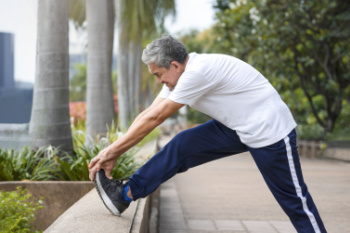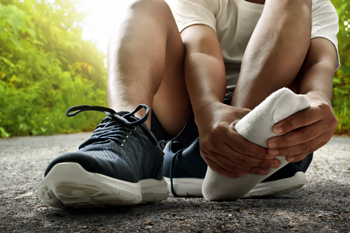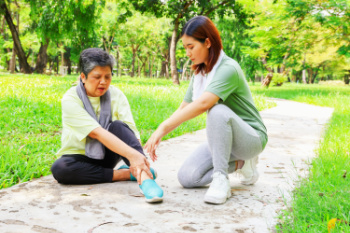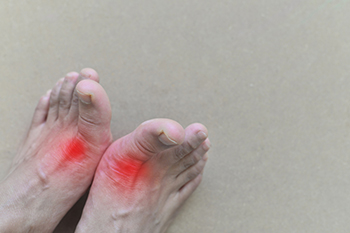Connect With Us
Blog
Items filtered by date: July 2025
Tuesday, 29 July 2025 00:00
Common Foot Injuries From Running

Running can lead to several common foot injuries, such as plantar fasciitis, stress fractures, Achilles tendinopathy, and shin splints. These conditions often result from overuse, poor running form, wearing shoes that lack adequate support, or a sudden increase in training intensity. Risk factors include flat feet, high arches, tight muscles, and inadequate warm-up routines. Prevention involves wearing proper footwear, stretching regularly, and gradually increasing activity levels. A podiatrist can assess foot structure, diagnose injuries, and provide custom orthotics, and guidance on safe training habits. If you are experiencing foot pain related to running, it is suggested that you visit a podiatrist who can treat various foot and ankle injuries, and guide you on effective running injury prevention tips.
Exercising your feet regularly with the proper foot wear is a great way to prevent injuries. If you have any concerns about your feet, contact Carrie Frame, DPM of West Virginia Foot & Ankle. Our doctor will treat your foot and ankle needs.
How to Prevent Running Injuries
Many common running injuries are caused by overuse and overtraining. When the back of the kneecap starts wearing out and starts causing pain in your knee, this is commonly referred to as runner’s knee. Runner’s knee is a decrease in strength in your quadriceps and can occur if you’re not wearing properly fitted or supporting shoes. To prevent runner’s knee, focusing on hip strengthening is a good idea, as well as strengthening your quads to keep the kneecaps aligned.
What Are Some Causes of Running Injuries?
- One cause of a common running injury is called iliotibial band syndrome.
- Plantar fasciitis is also another common injury.
- Stress fractures can occur from overtraining, lack of calcium, or even your running style.
Best Ways to Prevent Running Injuries
- Wear footwear that fits properly and suits your running needs.
- Running shoes are the only protective gear that runners have to safeguard them from injury.
- Make a training schedule. Adding strengthening exercises as well as regular stretching can help keep you strong and limber and can lessen the possibility of injuries.
- Stretching keeps muscles limber; this will help you gain better flexibility.
If you have any questions, please feel free to contact our office located in Charleston, WV . We offer the newest diagnostic and treatment technologies for all your foot care needs.
Tuesday, 22 July 2025 00:00
Causes of Foot Pain While Walking

Foot pain while walking can stem from a variety of conditions involving the many bones, tendons, ligaments, and nerves in the feet. Plantar fasciitis often causes sharp heel pain, due to inflammation of the plantar fascia, which runs along the sole of the foot. Metatarsalgia, which affects the ball of the foot, can feel like stepping on a pebble and may worsen with activity. Morton’s neuroma involves nerve thickening between the toes and often causes burning or tingling. Tendinitis, including Achilles or peroneal tendinitis, leads to pain that intensifies with continued use. Flat feet may strain the arch and inner ankle, while arthritis can inflame multiple foot joints. A podiatrist can properly diagnose these issues and offer appropriate treatment, including surgery, when needed. If you experience foot pain while walking, it is suggested that you schedule an appointment with a podiatrist for a diagnosis and appropriate treatment.
Foot Pain
Foot pain can be extremely painful and debilitating. If you have a foot pain, consult with Carrie Frame, DPM from West Virginia Foot & Ankle. Our doctor will assess your condition and provide you with quality foot and ankle treatment.
Causes
Foot pain is a very broad condition that could be caused by one or more ailments. The most common include:
- Bunions
- Hammertoes
- Plantar Fasciitis
- Bone Spurs
- Corns
- Tarsal Tunnel Syndrome
- Ingrown Toenails
- Arthritis (such as Gout, Rheumatoid, and Osteoarthritis)
- Flat Feet
- Injury (from stress fractures, broken toe, foot, ankle, Achilles tendon ruptures, and sprains)
- And more
Diagnosis
To figure out the cause of foot pain, podiatrists utilize several different methods. This can range from simple visual inspections and sensation tests to X-rays and MRI scans. Prior medical history, family medical history, and any recent physical traumatic events will all be taken into consideration for a proper diagnosis.
Treatment
Treatment depends upon the cause of the foot pain. Whether it is resting, staying off the foot, or having surgery; podiatrists have a number of treatment options available for foot pain.
If you have any questions, please feel free to contact our office located in Charleston, WV . We offer the newest diagnostic and treatment technologies for all your foot care needs.
Tuesday, 15 July 2025 00:00
Shoes Can Affect Your Foot Health

Shoes can have a significant effect on the health of your feet, especially when worn for extended periods of time on hard surfaces. Inadequate support may increase stress on the heel and forefoot, potentially contributing to conditions like plantar fasciitis, calluses, or metatarsalgia. Shoes lacking proper cushioning or arch support may fail to distribute pressure evenly. Restrictive styles, such as high heels, can alter foot posture and lead to bunions, claw toes, or thickened nails. Foot pain can also result from wearing poorly fitted or overly rigid footwear, which interferes with natural foot motion and joint alignment. People engaged in sports should select shoes specific to that activity and that provide adequate shock absorption and lateral stability. Alternating shoes regularly helps reduce repetitive stress and allows structural materials to recover. Shoe inserts, when prescribed by a podiatrist, may help improve foot posture and alleviate pain. If you experience foot pain after wearing certain shoes, it is suggested that you schedule an appointment with a podiatrist for a diagnosis and treatment, in addition to guidance on how to choose proper footwear.
It is important to find shoes that fit you properly in order to avoid a variety of different foot problems. For more information about treatment, contact Carrie Frame, DPM from West Virginia Foot & Ankle. Our doctor will treat your foot and ankle needs.
Proper Shoe Fitting
Shoes have many different functions. They cushion our body weight, protect our feet, and allow us to safely play sports. You should always make sure that the shoes you wear fit you properly in order to avoid injuries and deformities such as: bunions, corns, calluses, hammertoes, plantar fasciitis, stress fractures, and more. It is important to note that although a certain pair of shoes might be a great fit for someone else, that doesn’t mean they will be a great fit for you. This is why you should always try on shoes before buying them to make sure they are worth the investment. Typically, shoes need to be replaced ever six months to one year of regular use.
Tips for Proper Shoe Fitting
- Select a shoe that is shaped like your foot
- Don’t buy shoes that fit too tight, expecting them to stretch to fit
- Make sure there is enough space (3/8” to ½”) for your longest toe at the end of each shoe when you are standing up
- Walk in the shoes to make sure they fit and feel right
- Don’t select shoes by the size marked inside the shoe, but by how the shoe fits your foot
The shoes you buy should always feel as good as they look. Shoes that fit properly will last longer, feel better, and improve your way of life each day.
If you have any questions please contact our office located in Charleston, WV . We offer the newest diagnostic and treatment technologies for all your foot and ankle needs.
Thursday, 10 July 2025 00:00
Heel Pain Can Be Treated!
Tuesday, 08 July 2025 00:00
Differences Between Ankle Sprains and Strains

Sprains and strains often affect the feet, toes, and ankles, but they involve different tissues and require different care. A sprain is a stretched or torn ligament, which is the strong tissue that connects bones at a joint. Sprains primarily occur when the joint twists or rolls in an unusual way. Symptoms include pain, swelling, and bruising, and can sometimes feel like a fracture. A strain, however, occurs when a muscle or tendon is overstretched or torn during forceful movement or sudden extension. These injuries also cause pain, tenderness, swelling, and sometimes bruising. Mild sprains and strains usually improve in a few weeks, but severe ligament or tendon tears may take months to repair or may need surgery. A podiatrist can examine the injured area, request imaging if needed, and determine the treatment plan depending on the severity. If you have injured a foot or ankle, it is suggested that you schedule an appointment with a podiatrist for a diagnosis and appropriate treatment.
Although ankle sprains are common, they aren’t always minor injuries. If you need your ankle injury looked at, contact Carrie Frame, DPM from West Virginia Foot & Ankle. Our doctor can provide the care you need to keep you pain-free and on your feet.
How Does an Ankle Sprain Occur?
Ankle sprains are the result of a tear in the ligaments within the ankle. These injuries may happen when you make a rapid shifting movement while your foot is planted. A less common way to sprain your ankle is when your ankle rolls inward while your foot turns outward.
What Are the Symptoms?
- Pain at the sight of the tear
- Bruising/Swelling
- Ankle area is tender to touch
- In severe cases, may hear/feel something tear
- Skin discoloration
Preventing a Sprain
- Wearing appropriate shoes for the occasion
- Stretching before exercises and sports
- Knowing your limits
Treatment of a Sprain
In many cases, the RICE method (Rest, Ice, Compression, and Elevate) is used to treat ankle sprains. However, you should see a podiatrist to see which treatment option would work best with your injury. In severe cases, surgery may be required.
It is important to ask your doctor about rehab options after you receive treatment for your injury. Stretching, strength training, and balance exercises may help the ankle heal while also preventing further injury.
If you have any questions, please feel free to contact our office located in Charleston, WV . We offer the newest diagnostic and treatment technologies for all your foot care needs.
Tuesday, 01 July 2025 00:00
Avoiding Flare-Ups From Gout in the Feet

Gout is a type of arthritis that can cause sudden, intense joint pain, often starting in the foot. It occurs when uric acid levels in the body become too high, leading to crystal buildup in the joints. The result may be swelling, warmth, and tenderness that feels severe and may limit movement. Certain dietary habits, including heavy intake of rich meats, shellfish, and sugary drinks, can contribute to these flares. Staying well-hydrated and following a balanced eating plan may help lower risk. In some cases, medicine is needed to manage the condition and avoid long-term damage. Preventing repeated episodes is possible with consistent attention to lifestyle and proper medical support. If you are facing unexplained joint pain or discomfort in your foot, it is suggested that you visit a podiatrist to discuss options for relief and prevention.
Gout is a painful condition that can be treated. If you are seeking treatment, contact Carrie Frame, DPM from West Virginia Foot & Ankle. Our doctor will treat your foot and ankle needs.
What Is Gout?
Gout is a form of arthritis that is characterized by sudden, severe attacks of pain, redness, and tenderness in the joints. The condition usually affects the joint at the base of the big toe. A gout attack can occur at any random time, such as the middle of the night while you are asleep.
Symptoms
- Intense Joint Pain - Usually around the large joint of your big toe, and it most severe within the first four to twelve hours
- Lingering Discomfort - Joint discomfort may last from a few days to a few weeks
- Inflammation and Redness -Affected joints may become swollen, tender, warm and red
- Limited Range of Motion - May experience a decrease in joint mobility
Risk Factors
- Genetics - If family members have gout, you’re more likely to have it
- Medications - Diuretic medications can raise uric acid levels
- Gender/Age - Gout is more common in men until the age of 60. It is believed that estrogen protects women until that point
- Diet - Eating red meat and shellfish increases your risk
- Alcohol - Having more than two alcoholic drinks per day increases your risk
- Obesity - Obese people are at a higher risk for gout
Prior to visiting your podiatrist to receive treatment for gout, there are a few things you should do beforehand. If you have gout you should write down your symptoms--including when they started and how often you experience them, important medical information you may have, and any questions you may have. Writing down these three things will help your podiatrist in assessing your specific situation so that he or she may provide the best route of treatment for you.
If you have any questions, please feel free to contact our office located in Charleston, WV . We offer the newest diagnostic and treatment technologies for all your foot care needs.

